Submitted by Steve Irons on Mon, 23/03/2015 - 1:12pm
On Friday 20 March, 2015 Australia lost an important voice. The voice of Malcolm Fraser. Here is a personal account of this moment.
Late 60s & 70s – Malcolm Fraser
In the late 60s and through the 70s, I hated Malcolm Fraser with a passion. These were highly political and politicised years. Some of my hatred he deserved; some he didn’t deserve, but he got it anyway, often because of my ignorance in the face of obvious facts, I can say now, looking back, but often because of a secrecy about his role as a member of the ruling elite, and a sort of contempt members of parliament seem to have for members of the working class, seeing no necessity to explain anything to them unless you needed them to know something to achieve a particular political result, like the need to push them to ”lay down their lives” for the “good of their country” in a conflict such as the Vietnam War.
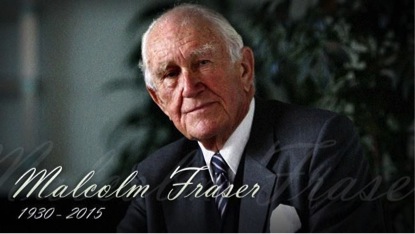
https://www.pinterest.com/pin/418553359095112231/
Well that’s how it seemed at the time, anyway. But, first, as this is a personal eulogy, some background stuff, about me:
My first memory of a political event was when I was just 10-years-old. The Bay of Pigs.
(Personal Note on the thinking of a 10-year old: Of course, this is very young in today’s terms, and on families today, you’d wonder if I was even conscious. But I was. And it happened because I had spent a lot of my life so far, not with other kids, but in the shearing sheds, as an unpaid rouseabout.
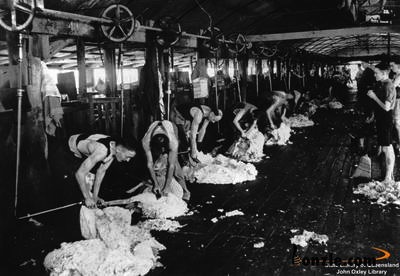
http://ozfolksongaday.blogspot.com/2011_07_01_archive.html
Here’s me with my broom. My old man is fifth in line. My old man was a contractor and so any money he could save on “penning-up & rouseabouting” was money for him, a bit of extra beer-money, and maybe even a shilling or two for the family. So he got me in there, very young indeed, on school holidays, even sometimes taking me out of school, to help out. If you spend a lot of time with the shearers, you hear “anything & everything” talked about in the morning smoko and the afternoon smoko and the one hour dinner break in the middle of the day, between four runs timed to the second like a public fight, no holding back, tell it like it is, expletives required; you grow up fast. You get taken to places you’d least expect. For example, there is nationalism and racism in the conservative AWU, but the realities of life in the sheds often called even these fundamentals, usual in your unionism, into question. When the shed was small, the number of shearers just a handful, you might get shearers talking shit during their smoko and getting away with it. But in the bigger sheds, this was less likely. In my days, you had German, Greek and Yugoslav blokes who came over to work on the Snowy but finished up shearing, who wouldn’t cop such shit. They had strong accents, which raised eyebrows, but what they were saying was generally seen to be pretty right on, & you could look stupid if you took them on without having your argument fully worked out. And you had some local black blokes, Abos they were called then, as shearers, as well. And you had to watch out, too, cos some of these might turn out to be the guns of the shed. If an Abo finished up getting close to 400 in a day, 50 or more in front of some big name shearers, 100-a-run, and 100 more than most, which I witnessed on a number of occasions, he earned a quiet respect and other blokes often finished up listening to him, and maybe even giving him a special place in the huts, or maybe even a proper place at the tea table at night put on by the cocky, or in the front bar in a pub in town, over a beer, on a Friday night. I can’t remember ever going along with racism myself; always saw it as shit coming out of the mouths of weak, gutless, imbeciles; but I have a clear idea where the alternatives, that “all men are equal”, came from. Of course I am lucky I grew up in a small country town not divided on racial lines, but that is another story.)
The Bay of Pigs
As I said, my first memory of any political event was The Bay of Pigs in Cuba. The Bay of Pigs incident was the height of the Cold War. The Americans couldn’t cop an armed revolt on their doorstep. They did everything they could to bring the revolt in Cuba 1959 to an end. Cuba had been their playroom, with brothels and casinos and fine upper class hotels and apartments, places for their moneyed elite to hang out. The CIA, getting involved all over the world during the Eisenhower administration, was active throughout the region, throughout the late 60s, causing as much instability and hatred for Castro as possible. In the beginning, Castro was a nationalist, looking for a new nation in Cuba, without the old corrupt ruling elite. But the actions of the CIA pushed him more and more in the direction of the Soviet Union. In early 1961, the US decided enough is enough, and sent the troops in to try to bring Castro down.
It was in The Bay of Pigs that the Americans got their arses kicked, and retreated like dogs with their tail between their legs.
Realities of the Cold War
But the realities of the future of the planet under “the Cold War” also became absolutely clear with The Bay of Pigs. Both superpowers were using the same story, as they divided up the world into two opposing camps; you’re either for us, or against us, make up your mind. It was at this moment that Castro and Khrushchev decided to install ballistic atomic weapons into Cuba, so ‘they’ could never do that again. It soon became clear that, at this moment, Kennedy was thinking in the same direction; aware ‘they’ might well try that on, and committed that if ‘they’ ever did try that on, the US would have no choice but to use nuclear weapons against ‘them’.
1962 Cuban Missile Crisis
Late 1962, the ongoing program to install atomic weapons into Cuba was brought out into the open and a stand off between Kennedy & Khrushchev, “The Cuban Missile Crisis”, put the future of the planet into the hands of two men with their fingers on the button. We were a moment away from annihilation, across the world. As a kid I was aware of these happenings, although I am not sure I had a position. I just watched from afar, as the mad old buggers in the sheds, the hard workers, the guns, the unionists, went over it and over it, in fine detail.
I tell you this because, for me, it impacts on my understanding of the Fraser years in a monolithic way.
1969 Fraser – Minister for Defence
It was around the time of the Bay of Pigs that Malcolm Fraser got elected to the Federal Parliament. It was not until years later, 1969, I became aware of Fraser. Fraser had just been promoted from junior posts like army minister (where he played a major role in introducing conscription for Harold Holt & Lyndon B Johnson), and education minister, to the key post of Minister for Defence.
http://en.wikipedia.org/wiki/Malcolm_Fraser
I was by that time quite politically aware. I had been watching the Americans (& Australians) getting their arses kicked in the Tet Offensive 1968, and other related happenings around the world, mainly the uprising of the Students in Paris 1968, against the War. The Little Red School Book came out around the same time.
1960s – the importance of the Domino Theory
When he took over as Defence Minister, I naturally associated Fraser with the Domino Theory, which (in Australia) said that if you let the communists take over in Vietnam the rest of South East Asia, Korea, Laos, Cambodia, Thailand, Burma, Singapore, Malaysia, Philippines, Indonesia, were certain to fall.
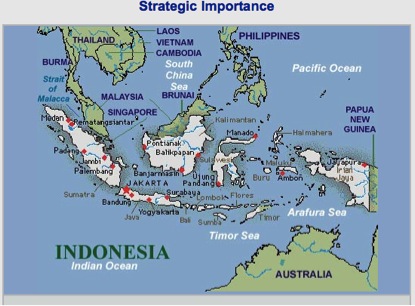
http://www.sukarnoyears.com/405strategic.htm
The Domino Theory was the key argument for justifying Australia’s involvement in Vietnam. It had actually been around since Eisenhower days, late 40s and the whole of the 50s. It was part of the propaganda machine the Australian government needed when they (using Fraser to do the hard job of implementation) brought in conscription 1964.
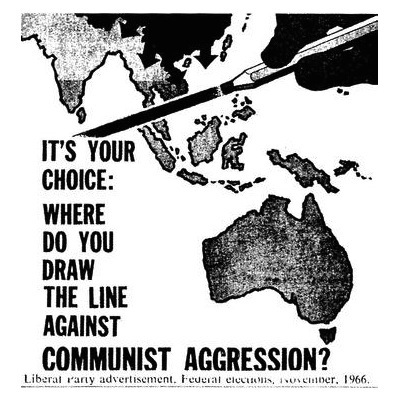
Liberal Party ad, federal elections 1966 http://quoteimg.com/domino-theory-vietnam-war/
The cartoon, showing these particular dominos falling in Australia’s direction, was only used in Australia
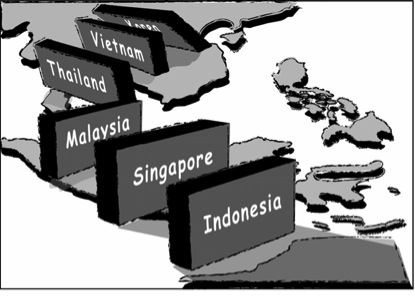
The one I remember was slightly different to this (I think) but this one shows the general features of the propaganda cartoon http://web3.katoomba-h.schools.nsw.edu.au/hsie/index.php?view=article&ca...
(Was this how the Americans saw the Domino theory? No! the Americans saw the falling of dominos as part of their ‘containment theory’ which built a wall around the Soviet Union & China and saw any failure in ‘containment’ as the first fall of a ‘domino’ that would cause others to fall and inevitably take communism to the rest of the world. At the end of WWII these ‘dominos’ started falling: in Berlin for example, and the Americans sent thousands of flights into Berlin to allow life to continue normally in the face of the threat of starvation caused by controls laid down by the Soviet Union; the dominos fell in Greece, and in Korea, and in Vietnam. The containment action by the US in Korea was massive, with huge deaths on both sides and little or no progress, just containment. The Americans drew a border between so-called ‘North’ and ‘South’ Vietnam using the abstract border created by a geographical latitude as they had done in Korea in an attempt to ‘contain’ communism to the ‘north’, but the Vietnamese could not be contained, so they escalated and escalated until it became clear the issue was never going to be solved by ‘containment’. The Americans were now committed to winning the war.
No, the cartoon used to sell ‘containment’ and the ‘domino theory’ in Australia (above) was not used in other parts of the world, like in America. Falling dominos at any point around that wall of containment was a completely different picture. The Americans were concerned about Indonesia, for example, but the cartoon above wouldn’t have helped them much at home. The Americans were concerned not about the impact of a coming communism in Indonesia on Australian democracy, but in keeping open the shipping lanes between the Pacific and the Indian oceans. Cos if you lose those shipping lanes, you have to go another "half way 'round the world" to get anywhere in the Indian Ocean or the Middle East. Take a look at the containment map "Strategic Importance" above to see what I mean.
But the "domino theory cartoon" was very useful in Australia and was used throughout the 60s to justify conscription. It gave the punters the idea that the US were involved in Vietnam mainly to help out their mates in Australia, to save them from the deadly peril of an advancing communism, and so we needed to play our part. It fitted the Aussie mentality of the White Australia Policy, fully supported by the ALP, and more than a century of racist rhetoric about the dangers of a British outpost needing to survive in a hostile environment in Asia).
Was Malcolm Fraser into the Domino Theory?
Yes, as I said, when he took over as Defence Minister, I naturally associated Fraser with the Domino Theory. But, it seems I was wrong! It seems now looking back that Fraser was actually very different to most of his MP party colleagues; that he was personally opposed to the Domino Theory and may even have lost his job as Defence Minister under Gorton because of it! But that wasn’t clear to us "student troublemakers", opposed to the war, at the time.
We had no idea what was going on when he up and resigned his post as Defence Minister May 1971, declared a spill (like we have seen with the spill by backbenchers attempting to sack the buffoon Abbott in recent weeks) and got the buffoon Billy McMahon elected to replace Gorton, with Gorton as McMahon’s deputy.
We supposed Fraser had wanted Gorton to stand aside and let him run the show and the handling of the spill had all been a bit of a shambles, with a wily old Gorton, too clever to go quietly, leaving the party with the worst of all possible options, a bufoon to make Gorton look like the king overthrown, not an intellectual like Fraser to take them to a new world. Since May 1970 with the killing of students in Kent State University, it felt like our lives were on the line, and we saw key ministers like Fraser as just working for the CIA, and doing their bidding. We saw the Domino Theory as a nasty joke, used to justify brutal anti-democratic involvement of the US & the CIA around the world; especially in third world countries keen to develop and take control of their own futures, but also in key members of US alliances, like Australia.
Fraser & the CIA
When Whitlam was booted out of office November 1975, Fraser was heavily engaged with ASIO and the CIA. And the “you’re either for us or against us” of the Cold War was still vibrant.
The Domino theory was long gone. Even in the last days of the McMahon government, under Minister of Defence Fairbairn, the Domino Theory played less and less of a role, ’though we still saw the “dominos falling” cartoon from time to time on the telly. When Whitlam came to power we never heard of it again. He dumped it in the dustbin of history, where it belonged.
And Whitlam modified the Cold War model by his ending Australia's involvement in the Vietnam War and ending conscription, his recognition of China, his recognition of the importance of Indonesia to the future of Australia, his commitment to independence in PNG.
So it seemed pretty obvious at the time that the big difference between Whitlam and Fraser was this: when it came to the interests of the superpower and getting into bed with the CIA, Whitlam just could not be trusted, whereas Fraser was seen as part of a conservative establishment, who could. The CIA was so arrogant in the 60s and 70s they could bring the democracy of a major ally to its knees because its popular leader could not be trusted to do their bidding.
Those who try to make out that the CIA were not involved in Whitlam’s sacking and that Fraser was not consciously doing the bidding of a superpower, prepared to trade democratic rights and freedoms of Australians to further the interests of an international power elite, have forgotten the realities of the day.
Noone has ever tried to offer an alternative explanation, leaving a big black hole as to why Kerr & Fraser in cahoots acted the way they did. The only argument that could possibly be used to justify the constitutional crisis that Fraser was acting as figurehead for, the throwing away of democratic rights and freedoms of your own voters for higher ideals that could not be expressed because they were defined by necessities that needed to be hidden from the punters, is a Cold War mentality.
We saw it clearly at the time and we hated Fraser with a passion because of it.
Fraser had special commitment to a higher requirements for politicians
That having been said, I have to say, looking back with the benefit of hindsight, that whereas Fraser came to power in the form of an undemocratic coup, once in power, and once having gone to the people to obtain some legitimacy, Fraser had the guts and determination to generally “do the right thing” when in office; even when facing protest from us on the left and being severely criticised on his own side of parliament and the traditional conservative elite; something that no subsequent Prime Minister on either side of the parliament has actually had the guts to do, ever since (and the current PM is even incapable of considering what I mean by this, so far have we fallen!) Whitlam set a high standard in modern governance, and Fraser, generally speaking, took notice. He delivered benefits for an Australian elite, yes, but on the big issues introduced by Whitlam, Fraser, on the whole, maintained them and developed them, to the benefit of all.
To understand this, one only has to compare what Fraser did with his time in office with what Abbott is doing now, adopting the stance of a punch-drunk pathological liar, smashing up anything of any value, with a concern for nothing but the mind of a boxer trying to stay in the ring and go the full ten rounds when everyone knows he's been put in the wrong ring; he should be carrying the water tray. To understand the difference, one only has to read the scathing tweets of Malcolm Fraser when he tells us how to understand Abbott's next bit of garbage.
Anyway, back to Fraser: We have heard a lot about this aspect of Fraser, "doing right by the nation in the face of huge pressures to stick the boot in", an "emminent statesman", in the eulogies.
http://theconversation.com/a-giant-of-australian-public-life-tributes-fl...
This included a continuation of policies framed by the Whitlam government; such as:
- enacting land rights for Aboriginal people in the Northern Territory
- introducing multiculturalism
- establishing the Special Broadcasting Service SBS
- bringing in major environmental initiatives including banning sand mining on Fraser Island
- banning whaling in Australian waters
- maintaining free education
- maintaining free universal health care
- maintaining Medicare
- and so on
See http://www.afr.com/news/malcolm-fraser-the-liberal-who-went-from-right-t...
Personally, I was employed in a Whitlam social development organization that lasted a couple of years after Whitlam’s sacking and then got chopped by Fraser, so I was aware of some of the commitments Fraser was prepared to guarantee into the future, and those he could not. As noted above, I had been involved in political activities against apartheid in South Africa before Whitlam came to power, and so was aware that Fraser had conducted himself well internationally on such issues as the Gleneagles Agreement in 1977 and his support for the influx of Vietnamese refugees in the late 70's. It seems pretty clear that if Fraser had not been prepared to take a major initiative on both these issues, the final outcome internationally might have been very different. Fraser and Thatcher for example get the formal accolades for the rewriting of apartheid but Thatcher was just a figurehead, Fraser did all the work to make it happen.
Was Fraser a supporter of apartheid?
It seems now looking back that Fraser unlike the majority of his MP party colleagues was anti-apartheid and was actually genuinely anti-racist.
Of course we had no way of knowing that when we protested against the Springboks in Sydney later in the year 1971, before Whitlam came to power, taking on the LNP government in the process; an important moment in the long arduous dismantling of apartheid in Rhodesia and South Africa; Fraser was sitting on the backbench for being a party trouble maker and was aloof from what was happening on the ground.
But subsequent actions by Fraser, both in government and as an ex-PM still willing to take an active role in Australian political life, give a consistent view of a principled player, when it comes to racism.
In the words of Financial Review:
He played an important role in the “Gleneagles Agreement 1977 between Commonwealth countries which prevented South Africa from taking part in sporting tours. But its historic significance was that it paved the way for the dismantling of the white-majority regime in Rhodesia, and its later emergence as the independent, and initially democratic, state of Zimbabwe. Gleneagles was also an important landmark on the way to the later collapse of the white-ruled Apartheid Government in South Africa and the release of African National Congress leader Nelson Mandela.”
“…students of Fraser's life detected a man cut from a different hue, dating back to his election as the member for Wannon at the youthful age of 25. His forthright espousal of Liberal policies was mixed with a then unfashionable defence of the rights of people remote from the mores of White Australia, like black Africans in apartheid South Africa and the then British colony of Rhodesia, later Zimbabwe.
“An early indication that Fraser was, indeed, different to many of his Liberal colleagues came with his passionate defence of the black Africans gunned down by white policemen after demonstrating for freedom in Sharpeville, South Africa, in 1960.”
READ more: http://www.afr.com/news/malcolm-fraser-the-liberal-who-went-from-right-t...
1960, that is? Of course I was still a little kid back in the shearing sheds when this was going down, and couldn’t be expected to be aware of this.
In his final years: Fraser the political analyst & activist
So, my eulogy is probably this: Malcolm Fraser: I hated him and then I learned to love him.
Note: the tone taken in this blog is very personal and I have to blame Van Badham for that, her personal eulogy was moving and appropriate to the moment. Read her article http://www.theguardian.com/commentisfree/2015/mar/20/im-devoutly-red-but...
I want now to jump to the modern era and focus for a moment on the Fraser that I got to know, personally.
My key objective since the 2020 Summit in Canberra 3 December 2007 has been to promote a major constitutional change in Australia, one that leads naturally to long term sustainability and removes the natural tendency for corruption; a corruption that derives from a form of statehood, embedded in the existing constitution, that was already out of date decades before the modern federal constitution was agreed to, by the states, in 1901.
To help me achieve my objective, I set up the BloggerMe website:
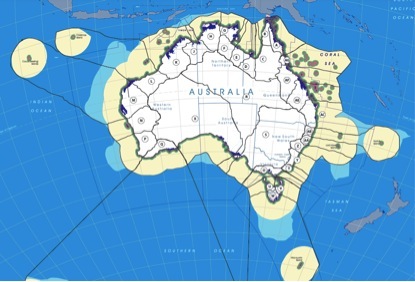
The website has two parts,
- the defining of new state boundaries based on the flow of water that naturally assist in long term sustainability and naturally reduce the likelihood of corruption (see pic above) (Note: to check out each proposed state (or substate) highlight a proposed state on http://www.BloggerMe.com.au inside the proposed boundary and click on it);
- a series of blogs helping others to understand the new boundaries and the benefits they offer to life, long term, in a “new Australia” – an Australia that has new constitutional arrangements including the end of the monarchy and the introduction of a new republic http://www.bloggerme.com.au/bloggers
The website began operating in August 2012, five years after the Summit, 5 years in which I had time to refine the initial design put up to the Summit. The BloggerMe website, surprisingly, put me in touch with a different Malcolm Fraser than the one I had learned to hate all those years ago. It was only a couple of years. But in those couple of years he assumed a huge stature. He was someone I learned to love.
In August 2012 I went looking for “key persons” active on the Internet that might be interested in what I was trying to achieve and who might even be prepared to put their name to it, as a “worthwhile project”. To my surprise, one of the first key persons I found was Malcolm Fraser. He was intellectually active, writing and actively participating in political discourse, on a range of subjects, in a range of venues, clearly seeking to have an influence over a political climate that he felt had lost its direction and focus.
I approached him and found him to be one of the clearest thinkers in today’s muddied waters. He was not interested in me, where I had come from, which party I had been in, which party I "secretly represented" now, like everyone else seemed to be fixated on, he was only interested in ideas, and he took everything I had to say on its merit, not on whose mouth it came out of. It was like a breath of fresh air.
I asked him to understand my objectives and, if he liked them, to add his name to the website as a Supporter or Thinker. He considered my request and in September 2012 gave me the following letter of support.
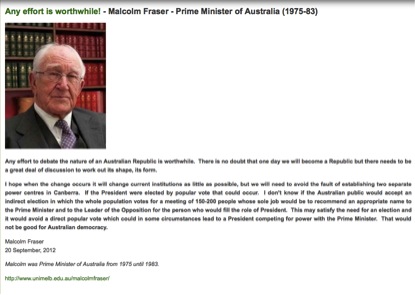
See Malcolm Fraser’s letter of support http://www.bloggerme.com.au/supporters-thinkers
He was basically saying that, while he may not have done things the way I had done them, he nevertheless was genuinely encouraging me to continue with my project, stating that he thought I was focussing on issues that needed to be addressed as we move towards a new republic, a move which he genuinely supported. Malcolm gave me his email address and was always there (since 2012) if I had serious questions regarding tactics or an assessment of what was possible in the banal 2PP environment. I didn’t use it much, not wanting to be a burden on a busy productive life of an elder statesman, except when serious issues needed the clear thinking of an experienced elder statesman. He was always there for me, for which I will be eternally grateful.
The thing that Malcolm and I agreed on, more than anything else, was that the key 2PP parties have lost touch with their base on both sides of politics and provide little or no prospect of rejuvenation. Certain issues are in crisis mode and will never be addressed. There is a real need for a new broad-based political party, and he and I agreed we are prepared to do what we can to make it happen. But under present arrangements, prospects are not good.
On Twitter I followed Malcolm and found him one of the clearest thinkers.
Malcolm had a huge group of followers on Twitter from August 2012 to last week. Over the last two and a half years I saw him engage with a range of twitterers in a warm and friendly voice. His tweets were absolutely clear and precise and always had links to important follow up material. He was always worth a RT. There was nothing aloof or impersonal about this important twitterer. If he had ever suffered from this, it certainly wasn’t there now. I am going to miss his daily routines more than any other I follow. His daily tweets continually gave me things I needed or helped me quickly to form opinion on a wide range of issues.
RIPMalcolm.
I put together a list of whom I thought were prospective key persons which include @MalcolmFraser12. This list has a few key persons left off because of their inability to address key issues of tantamount importance for fear of tarnishing the brand.
On @Twitter the list is interesting
https://twitter.com/BloggerMe3/lists/keyaussies/members
Key ideas of the 149 people on this list make for an interesting read on @Pinterest
https://www.pinterest.com/bloggerme3/key-aussies/
Malcolm’s books are listed here
https://www.pinterest.com/bloggerme3/biography/
Further read
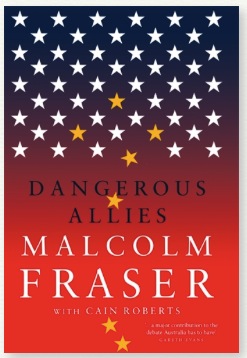
https://www.pinterest.com/pin/418553359095141942/
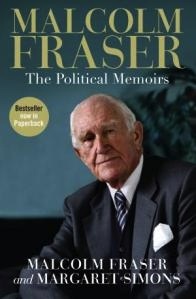
https://www.pinterest.com/pin/418553359092753871/
Fraser's manifesto for a new party http://media.crikey.com.au/wp-content/uploads/2015/03/Statement-of-Value...
Other: http://theredandtheblue.org/2015/03/20/former-liberal-prime-minister-mal...
http://www.theguardian.com/commentisfree/2015/mar/20/malcolm-fraser-a-le...
http://www.theguardian.com/commentisfree/2015/mar/20/frasers-great-conse...


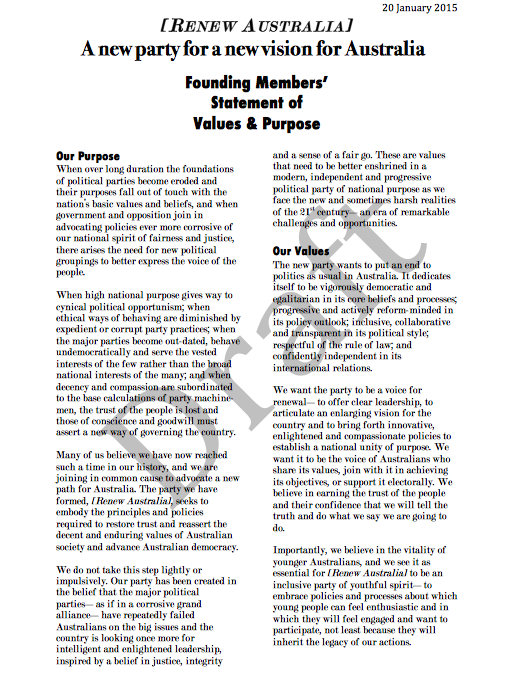
Comments
Steve Irons
Sat, 28/03/2015 - 8:00pm
Permalink
Malcolm Fraser - looking back at the life of a 'big man'
Malcolm Fraser, Australia's Prime Minister from 1975 to 1983, has passed away at the age of 84 and we look back at his political career, from rising to the top job after Gough Whitlam's dismissal to speaking out in more recent years on social issues.
http://www.abc.net.au/news/2015-03-20/malcolm-fraser---looking-back-at-t...
Matt Mitchell
Sat, 28/03/2015 - 11:34am
Permalink
Fraser's Eulogy
Thanks for this Steve,
A really interesting history for someone a bit younger than yourself, but old enough to just remember Fraser in office. I agree, I was quite impressed with Fraser in recent years, questioning the media's official story about what was going on in Ukraine and making good comments on many other issues.
Whatever he may have done in the past, I am also prepared to forgive, as he obviously ended up a fairly decent human being with good values, and not only that, but prepared to speak up. He certainly stood a far cry from the members of the Liberal party we have today. I read somewhere that it was not the he drifted left from the Liberal party, but rather that the Liberal party drifted further to the right. I guess there is some truth in this.
Matt
Steve Irons
Fri, 27/03/2015 - 4:59pm
Permalink
Exclusive: Fraser’s progressive vision for a new political party
by Sally Whyte
http://www.crikey.com.au/2015/03/26/exclusive-frasers-progressive-vision...
crikey15
"Right up until the day he died, Malcolm Fraser was working seriously on starting a new political party, to be called Renew Australia. And Crikey can exclusively reveal its aims and manifesto.
"According to a draft 'Statement of Values and Purpose' from January this year, published for the first time today, the party was to focus on social justice, 'modern, progressive democracy' and ethical politics. The statement promotes the party as 'a new party for a new vision for Australia' and says that Australia needs a new political party because the major parties are united 'in advocating policies ever more corrosive of our national spirit of our national spirit of fairness and justice'."
Download Fraser's Manifesto
http://media.crikey.com.au/wp-content/uploads/2015/03/Statement-of-Value...
John
Thu, 26/03/2015 - 7:15am
Permalink
Nice to hear about personal experiences
Steve
As someone who was very young at this time but got to watch Mr Fraser in later years it is great to hear the personal stories. The school book history facts are one matter, but recording the experiences of people who lived through these times is great, especially someone observant and analytical.
John
Bill Shaw
Wed, 25/03/2015 - 10:48pm
Permalink
Malcolm Fraser
You've taken me back Steve to my youth. I recall just commencing work when Gough was rolled. That event was a catalyst in my becoming a political aware citizen. I resented at the time that is was ultimately the Queen of a foreign nation whose authority was used to sack a sitting Australiam PM. Despite the legality of this I found it repugnant and I became a republic supporter.
Fraser in his latter years let his humanity come to the forefront as unlike some latter day ex PM's he didn't see any value in defending any of his decisions whilst in the PM role.
Bighead1883
Wed, 25/03/2015 - 8:20pm
Permalink
Malcolm Fraser
mate I love your trip down memory lane and i sold newspapers on the streets of Brisbane CBD when JFK was murdered which opened my eyes to another reality then Harold Holt`s disappearance shook my young political bones at high school
I remember a few differing things as to MF`s CIA involvement as out union of the time "The Boilermakers and Blacksmiths Society"kept us in many political loops of the "born to rule Tory and his big mouthed Yank Boss"
You can only ever tell it as you`ve seen it yourself and I praise you for this as now it belongs as Australiana and Huzzah to you mate
Cheers Biggy
Alastair Nicholson
Wed, 25/03/2015 - 3:02pm
Permalink
Malcolm Fraser
Thank you Steve for sending a link to your Fraser eulogy which I thought very appropriate. Like you I was not an early fan of Fraser. I stood for the ALP in Victoria in 1972 and 74 and I remember standing enraged in the Domain in Sydney listening to Gough following the dismissal. I think your observations as to his Prime Ministership are particularly good however and his contribution to a decent immigration policy towards Vietnamese boat people on of his greatest achievements at that time.
In more recent years I have had the privilege of meeting with him and sharing platforms with him on a number of occasions and I formed a deep admiration for him. He was shy but very much a person of principle with a good mind and considerable courage. His work output and width of interests were remarkable. He had a deep regard for the Aboriginal people and a particular contempt for the bureaucratic approach to them of Canberra based senior public servants and the failure of successive Ministers for Aboriginal Affairs of both parties to cut through this bureaucratic jungle and include them in the decision making process.
His courage in defending asylum seekers and refugees generally stands in sharp contrast to the mealy mouthed leaders of the two major political parties. Warm Congratulations on the Eulogy.
Dr Clive Marks
Tue, 24/03/2015 - 11:00pm
Permalink
Malcolm Fraser
Thanks Steve
What a great series of reflections.
You give voice to what a lot of us are no doubt thinking. Malcolm Fraser won the surprised admiration of many. We knew him eventually by his deeds and his legacy. That he won such respect means that he truly earned it, even in the eyes of his detractors. No person can have a better eulogy than that.
Right up front in your article is the ideological class division of the day and the way that it drew the battle lines in Australian society - almost from birth.
One might even consider that Malcolm Fraser was as much a victim of his as anyone; born into a class with a pre-cast concrete view of the world that he eventually had to escape and confront.
I would imagine that being born in privileged circumstances on a farm, where hard work and earthy preoccupations still prevail, forms a very different person from one immersed only with material wealth of urban environments and a university as your political boot camp. I wonder if this is a common factor that you can relate to Steve, despite the working class roots you allude to?
Fraser was one politician that went onwards from the pack and defined himself and outgrew party politics. In his best years he no longer had a need to draw upon a shared party ideology as justification for his relevance and morality. He was a liberal, which begs the question as to what a liberal is today? Just an ordinary common garden conservative?
While his principled position as a party leader had been evident in some areas (in retrospect!) he was obviously liberated to be the person that he truly was only once he moved away from party politics. With reflection, the toxic nature of Australian ‘party’ politics appears to have done much to stifle dissent and public discussion about alternative values. We were not deaf to Malcolm Fraser’s values, the party system demanded that he be mute.
It raises the obvious question. Is our party political system inhibiting the best and most noble ideas and people; by ensuring that only those who find their way outside of it can truly contribute a vision that Australians can be proud of? Is it the dogmatic wedge politics and ‘with us or against us’ tribalism that is delivering politics devoid of true moral leadership and purpose?
Perhaps it is only those with the rock solid purpose of an Easter-Island statue that can assert their will? It appears that a true leader knows their own mind.
With the bookends of Whitlam and Fraser now lost, it is high time we use their legacy to seek the rebirth of principle in Australian politics.
Thanks again Steve – a bloody good read.
Shirley Green
Tue, 24/03/2015 - 2:43pm
Permalink
Malcolm Fraser
I really enjoyed reading this Steve because of all the historical factors that I have only had a vague memory or understanding of. I too, like many who lived during the wonderful Whitlam "It's time" era, loathed Fraser. But, I too, like many others of us today, grew to be very fond of him, particularly for his humanity and ethics. Thank you for such an interesting obituary for such an interesting, great man.
Maria Vaz
Tue, 24/03/2015 - 10:34am
Permalink
Malcolm Fraser
Thanks for the history lesson Steve. Always wonderful to read your thoughts. RIP Malcolm Fraser. What a passionate life of public service. Not an easy thing to do.
Kerry (John) Seebohm
Mon, 23/03/2015 - 5:31pm
Permalink
Malcolm Fraser
Thanks for your well written blog.
I too am a child who lived through that era 'till today. Your reflections are my reflections. I have been politically active since age 14 and still am today.
My conscription to Vietnam was a troubled time for me with ramifications for life. My arrest by the Military Police prior to being sent to Vietnam, handing out ALP "how to vote" cards at a polling booth, whilst I was dressed in full military uniform culminated in national media attention. But that was a long time ago now. Yes I hated Fraser too, but respected him in later life, and for whatever reason, he even followed me on Twitter. Vale Malcolm Fraser, a very good man. A very good Australian.
Add new comment